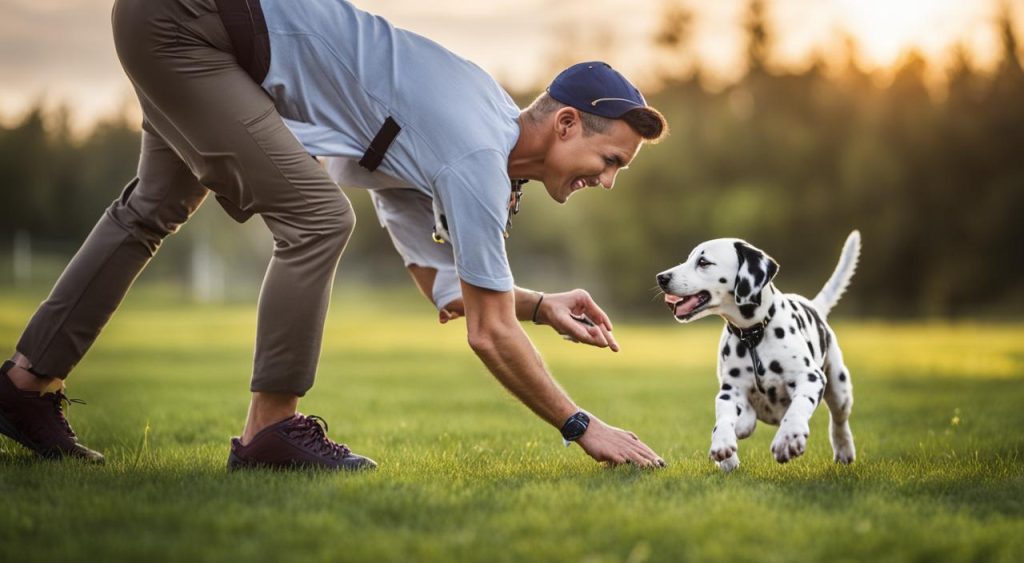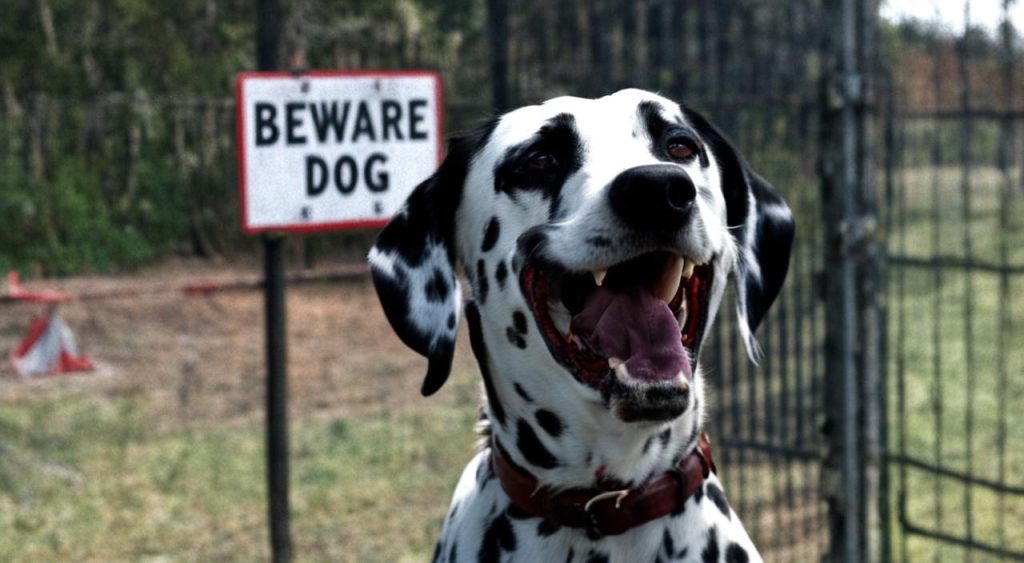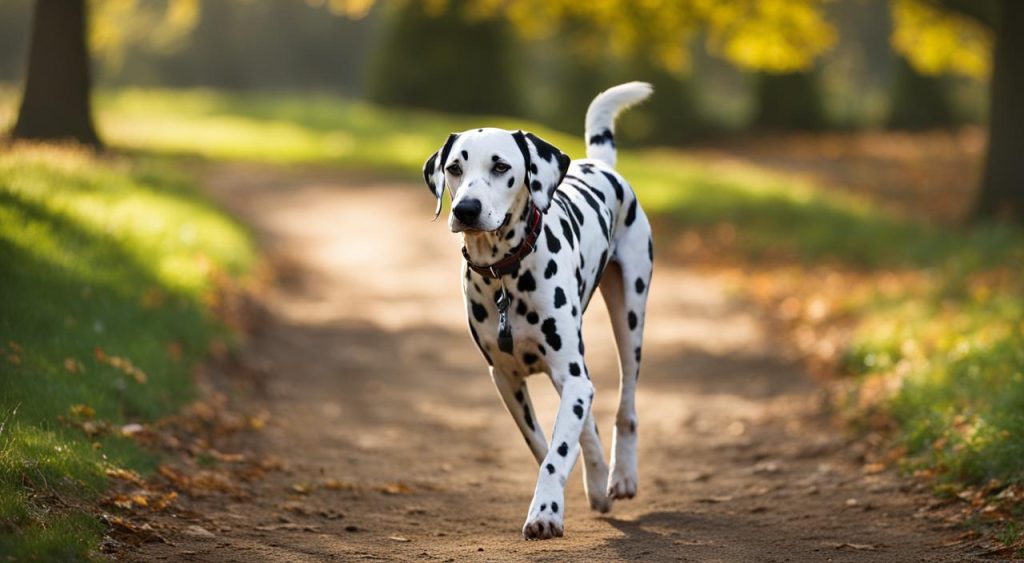Dalmatians are known for their striking coat markings and energetic nature. But when it comes to training, you may wonder if these beautiful dogs are difficult to train. Let’s delve into the world of Dalmatian training and uncover the truth behind their reputation.
Dalmatians, like any other breed, require training and socialization to become well-behaved and obedient companions. However, they do come with their unique set of challenges and training difficulties that need to be addressed with a tailored approach.
It’s important to understand that Dalmatians have a working background and were historically used as carriage dogs and firehouse dogs. They are highly intelligent and trainable, but they also have a high level of energy and need plenty of physical and mental stimulation.
One of the common misconceptions about Dalmatians is that they are unintelligent. However, it was later discovered that many Dalmatians are born deaf. Deafness doesn’t hinder their ability to be wonderful pets, but it does require training and management techniques that cater to their specific needs.
Key Takeaways:
- Dalmatians are trainable and intelligent.
- They have a high level of energy and need physical and mental stimulation.
- Puppy socialization is crucial for Dalmatians.
- Deafness is common in Dalmatians, but it doesn’t hinder their ability to be great pets.
- Training and management should be tailored to their specific needs.
Traits of Dalmatians
Dalmatians are remarkable dogs that possess a unique combination of traits. These large and energetic canines are known for their stunning coat markings, which make them easily recognizable. But their distinctive appearance is just the beginning of what makes Dalmatians special.
One of the most notable characteristics of Dalmatians is their friendly and affectionate nature. They are known for being silly and playful, bringing joy and laughter to their owners. Their playful demeanor makes them excellent companions for families and individuals alike.
Dalmatians also possess a high level of intelligence. They have the capacity to learn and understand various commands and tasks, which makes them excellent candidates for training.
Suitable as Watchdogs
While Dalmatians are known for their friendly nature, they also have a natural instinct to protect their family and territory. This makes them good watchdogs, as they are alert and responsive to any potential threats. With proper training and socialization, Dalmatians can effectively balance their friendly and protective behaviors.
Breed-Specific Behavioral Traits
However, it’s important to note that Dalmatians, like any other breed, have their own breed-specific behavioral tendencies that should be considered during training. Dalmatians can sometimes be over-sensitive or reactive, which means they may have strong reactions to certain stimuli or situations. They can also display resource guarding behaviors if not properly trained and socialized.
To ensure a well-rounded and well-behaved Dalmatian, early training and socialization are essential. This will help prevent or minimize the risk of these behavioral issues and enable them to become confident and well-adjusted dogs.
In conclusion, Dalmatians possess a blend of captivating traits, including their striking appearance, friendly nature, and high intelligence. While they have the potential to be excellent companions, it is important to provide them with the necessary Dalmatian behavior training and Dalmatian puppy training to ensure their behavioral well-being.
Dalmatian Training Tips
To effectively train Dalmatians, you need to take into consideration their energetic nature and the importance of physical exercise. Dalmatians are active dogs that require regular exercise to keep them mentally and physically stimulated. One helpful tool for providing extra physical exercise indoors is a treadmill designed for dogs.
When left alone, Dalmatians can become destructive due to their high energy levels. To prevent this, it’s important to provide them with interactive toys and engage in crate training. These measures will help keep them entertained and prevent destructive behaviors.
Socialization is key to training Dalmatians as they can show aggression towards other dogs if not properly socialized. By exposing your Dalmatian to different people, animals, and environments, you can help them develop positive behaviors and interactions. Enrolling them in puppy socialization classes can be beneficial.
When it comes to training, consistency is crucial. Establish a regular training routine and use positive reinforcement techniques. Remember to be confident and assertive during training sessions to effectively communicate with your Dalmatian.
Reward-based training works well with Dalmatians. Use treats, praise, and play as rewards for good behavior. This will motivate your Dalmatian to learn and obey commands.
Training Challenges with Dalmatians
Dalmatians are known for their stubborn nature, which can present challenges during training. To effectively train a Dalmatian, consistency and patience are key. Training criteria may need to be broken down into small steps to encourage progress and achieve the desired results.
One challenge that Dalmatian owners often face is their attachment to their owners. Dalmatians may become easily anxious or stressed when left alone. Teaching them to relax when apart from their owners is an important aspect of their training, helping them develop independence and reduce separation anxiety.
Dalmatians can also be too energetic for small children, especially during initial meetings. It is crucial to introduce Dalmatians slowly and in a calm manner to ensure a positive interaction. Supervision and guidance are necessary to prevent accidents or overwhelming situations.
Another common challenge is leash-walking. Dalmatians have a natural tendency to pull, making leash training essential. Using positive reinforcement techniques and engaging their high energy levels during walks can help encourage good leash manners.
To overcome these training challenges, it is important to establish a consistent training routine and use positive reinforcement techniques. Breaking down training goals into manageable steps and providing mental and physical stimulation will help keep Dalmatians engaged and motivated. With patience and persistence, you can successfully train your Dalmatian and foster a strong bond built on trust and cooperation.
Effective Dalmatian Training Techniques
When it comes to training your Dalmatian, employing effective techniques is key to success. Here are some tips to help you train your Dalmatian effectively, especially if you’re a beginner:
Start with recall training using whistles: Whistles can be a useful tool for training your Dalmatian to come when called. Pair the sound of the whistle with treats and begin training in short distances with minimal distractions. This will help your Dalmatian associate the sound of the whistle with positive rewards and build a reliable recall.
Additionally, obedience and trick training can be beneficial for stimulating your Dalmatian’s intelligent mind and strengthening the bond between you and your furry friend. Teaching your Dalmatian to relax when alone and building independence are also valuable skills to develop.
Positive reinforcement is essential for successful Dalmatian training. Use high-value rewards such as treats or praise when your dog exhibits desired behaviors. This will motivate them to repeat those behaviors in the future.
Remember, patience and consistency are key when training your Dalmatian. With these effective techniques and plenty of practice, you’ll be on your way to a well-trained and happy Dalmatian!
Dalmatian Grooming Needs
Dalmatians have short, low-maintenance coats but are heavy shedders. Regular grooming is essential to control shedding and maintain the cleanliness of their coat.
To keep your Dalmatian’s coat in good condition, brushing should be done at least once a week. Bristle brushes are recommended for smoothing the coat, while slick brushes help remove loose hair. Regular brushing not only minimizes shedding but also promotes healthy skin and prevents matting.
In addition to brushing, bathing is necessary to keep your Dalmatian clean and odor-free. Use a dog shampoo specifically designed for dogs with short fur to avoid any skin irritations. Bathing frequency may vary depending on your Dalmatian’s activity level and tendency to get dirty, but generally, a bath every 2 to 3 months should be sufficient.
Dalmatian Health Concerns
Dalmatians, like any other breed, are prone to certain health conditions that owners should be aware of. By understanding these common health problems in Dalmatians and taking proactive measures, you can help keep your furry friend happy and healthy.
Atopy (sensitivity to allergens)
Atopy is a common health issue in Dalmatians, causing them to be sensitive to allergens such as pollen, dust mites, or certain foods. If your Dalmatian shows signs of itching, redness, or recurring skin infections, it’s essential to consult a veterinarian for proper diagnosis and treatment.
Urinary conditions like urolithiasis (bladder stones)
Dalmatians have a genetic predisposition to form urinary stones, known as urolithiasis. These stones can cause urinary tract infections, blockages, and discomfort. Regular veterinary check-ups and following a specific diet recommended by your vet can help prevent and manage such conditions.
Epilepsy
Epilepsy is a neurological condition that can affect Dalmatians. It causes recurring seizures, which can vary in severity and frequency. If you suspect your Dalmatian may have epilepsy, it’s crucial to consult with a veterinarian who can provide guidance and help manage the condition.
Deafness
Deafness is another health concern in Dalmatians, with a high percentage of the breed being either fully or partially deaf. It’s important to be aware of this possibility when training and communicating with your Dalmatian. Specialized training techniques and visual cues can help overcome the challenges associated with deafness.
Regular veterinary check-ups and health screenings are important in detecting and addressing these health conditions in Dalmatians. Additionally, socialization and training play a crucial role in preventing behavior issues associated with certain health conditions.
Caring for Your Dalmatian
When it comes to caring for your Dalmatian, there are a few important factors to consider. These dogs thrive in active households and require plenty of exercise and mental stimulation to keep them happy and healthy.
One crucial aspect of caring for your Dalmatian is ensuring they are not left alone for long periods. Dalmatians are social animals and need company to prevent destructive behavior that may arise from boredom or loneliness.
“Dalmatians should be trained using positive reinforcement and ongoing, consistent training.”
Training is another essential part of caring for your Dalmatian. Positive reinforcement training methods work best with these intelligent dogs. Rewards and praise are highly effective in motivating them to learn and behave appropriately. Ongoing and consistent training will help reinforce desired behaviors and prevent any unwanted habits from developing.
Socialization with other dogs and people is crucial for their development.
Dalmatians have a friendly and outgoing nature, but proper socialization is necessary to ensure they interact well with others. Exposing them to various situations, people, and different dogs from a young age will help them develop confidence and good social skills.
Regular grooming is another aspect of caring for your Dalmatian. While their short coat is low-maintenance, they are heavy shedders. Regular brushing will help control shedding and maintain their coat’s cleanliness. Using bristle brushes for smoothing the coat and slick brushes for removing loose hair is recommended.
Finally, preventative healthcare is important for your Dalmatian’s overall well-being. Regular veterinary check-ups and vaccinations will help detect and address any health issues early on. It’s also important to follow a proper diet and provide them with high-quality dog food that suits their age and activity level.
By providing your Dalmatian with plenty of exercise, positive training, socialization, grooming, and proper healthcare, you can ensure they thrive and lead a happy and healthy life as part of your family.
Dalmatians and Children
Dalmatians can be wonderful companions for children, but it is important to consider their high energy levels. While their friendly nature makes them great playmates for kids, their exuberance may not always suit households with young children.
Supervision is necessary to prevent accidental knocking over, especially when Dalmatians are in their playful moods. They may inadvertently bump into small children due to their enthusiastic nature and large size.
Proper socialization and training can help Dalmatians interact well with children. Teaching your children how to approach and interact with the dog safely can create a harmonious bond between them. Additionally, training the Dalmatian to be gentle and calm around children is essential.
“Dalmatians can form strong bonds with children and become lifelong companions. However, it is crucial to establish boundaries and teach both the children and the dog how to interact safely and respectfully.”
The key is to introduce the Dalmatian to children at a young age and provide consistent socialization experiences. Encouraging gentle play and positive interactions between the dog and the children will help foster a strong and trusting relationship.
Remember, every dog is an individual, and the temperament of Dalmatians can vary. It is always important to monitor interactions between children and dogs, regardless of the breed.
Dalmatians and Other Pets
When it comes to getting along with other pets, Dalmatians, with their proper socialization, can be a great addition to your furry family. While introductions with other dogs should be done carefully, Dalmatians can coexist peacefully if given the chance to interact and bond. Supervision is necessary, especially when introducing smaller pets to ensure a safe and harmonious environment.
“Proper socialization is key in helping Dalmatians establish positive relationships with other pets. Slow and controlled introductions allow them to adapt and accept new companions, making the integration smoother and more successful.”
Dalmatians were not bred for hunting or herding, which means they generally don’t display aggressive tendencies towards other household pets. With proper training, socialization, and positive interactions, Dalmatians can form strong bonds with not only dogs but also cats, rabbits, or other small pets.
Remember, each pet is unique, so early interactions and continued positive reinforcement are important in helping Dalmatians build trust and friendship with their fellow companions. By providing a supportive and nurturing environment, your Dalmatian can happily coexist with other pets, enriching their lives and yours.
Dalmatian Exercise Needs
Dalmatians are known for their high energy levels and require regular exercise to stay healthy and happy. As an owner, it’s essential to provide them with enough physical and mental stimulation to prevent boredom and destructive behavior.
To meet the exercise needs of your Dalmatian, you should aim for a minimum of two hours of exercise per day. This can be divided into multiple activities to keep them engaged and active.
1. Walks: Taking your Dalmatian for brisk walks is an excellent way to burn off energy. Aim for at least two thirty-minute walks each day, allowing them to explore their surroundings and stretch their legs.
2. Playtime: Dalmatians love to play, and engaging in interactive games is a great way to keep them physically active and mentally stimulated. Fetch, tug-of-war, and hide-and-seek are all popular choices.
3. Mental Stimulation: Dalmatians are intelligent dogs and benefit from mental challenges. Consider incorporating puzzle toys, treat-dispensing balls, or obedience training sessions into their daily routine to keep their minds sharp.
Tip: Engaging in activities like flyball and agility can be particularly beneficial for Dalmatians, as they provide both mental and physical exercise. These activities tap into their natural instincts and allow them to showcase their athleticism.
Remember, exercise needs may vary depending on your Dalmatian’s age, health, and individual energy levels. It’s always best to consult with your veterinarian to develop an exercise plan tailored to your dog’s specific needs.
By providing your Dalmatian with regular exercise and mental stimulation, you can ensure they lead a fulfilling and well-balanced life. A tired dog is a happy dog, and a tired Dalmatian is a well-behaved companion.
Dalmatian Food and Grooming
Proper nutrition and grooming are essential for maintaining the health and appearance of your Dalmatian. When it comes to food, it is important to feed them a high-quality, commercially available dog food that is specifically formulated for their age and activity level. This will provide them with the necessary nutrients to support their overall well-being.
In terms of grooming, Dalmatians have short coats that require regular brushing to control shedding and keep their coat’s cleanliness. It is recommended to use a bristle brush for smoothing the coat and a slick brush to remove loose hair. Regular brushing will help reduce the amount of hair found around your home and ensure your Dalmatian’s coat remains in good condition.
Bathing your Dalmatian should be done as needed, using a dog shampoo that is designed for dogs with short fur. This will help keep their coat clean and free from any dirt or odors. It is important to note that excessive bathing can strip their coat of its natural oils, so it is best to follow a bathing schedule recommended by your veterinarian.
Overall, providing your Dalmatian with a balanced diet and proper grooming will help keep them healthy, happy, and looking their best.
Conclusion
Dalmatians are highly trainable and intelligent dogs, but it’s important to provide them with the proper training, socialization, exercise, and grooming to thrive. They can make wonderful family pets, especially in active households that can meet their high energy needs.
To ensure the success of training, it’s crucial to understand the specific needs and potential health concerns of Dalmatians. Regular veterinary check-ups, health screenings, and proactive behavior management are essential.
By providing Dalmatians with consistent training, positive reinforcement, and mental stimulation, you can develop a strong bond with your furry friend. Remember to prioritize their exercise requirements and invest time in grooming to keep them happy and healthy.



